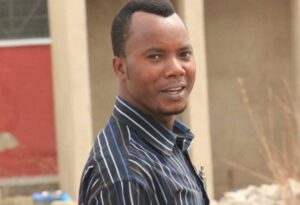The persecution of journalist Edward Adeti: A blot on a nation’s conscience

In his inaugural address on January 20, 1961, US President J. F. Kennedy said these famous words that have remained relevant for years. “Ask not what your country can do for you – ask what you can do for your country.”
There are few journalists in Ghana who can stick out their necks and say they are serving this country selflessly. Fact is, most aren’t even doing journalism. They are influence peddlers and communicators, serving the parochial interests of their paymasters, often corrupt politicians and business people. Indeed, some are even spies in the newsrooms, who leak information to their benefactors.
Among these few journalists whose commitment to accuracy, truth and the bigger public interest have set their works above the average journalist, is Edward Adeti. Like the true journalist cut in the mold, he keeps his head down, he is not loud or noisy, and has his works out there for all who care to see. Unlike some who have not a single investigative work to their credit but miss no opportunity to trumpet to the whole world that they are investigative journalists, Adeti’s investigations have yielded impact both in local and national politics.
But this outstanding journalist has been persistently persecuted, by corrupt politicians and judges, and while they do, the rest of the country whose interest his works serve have looked the other way. What’s even worse, his employers who owe him several months of salary have betrayed him more than once in his times of need.
Adeti’s remarkable work exposed a corrupt Upper East Regional Minister who was sacked. His works exposed a corrupt judge who instead of being sacked has been demoted and transferred.
Among Adeti’s determined persecutors is an organized group that claims to be serving the welfare of the Upper East, but appears more like a cabal established to milk the region for the personal interests of individual members. This group appears to be leading the mob baying for the blood of Adeti. Some members of this group have openly threatened to run over him with their vehicles anytime they find him riding his bike on the road.
Journalism is not a crime, and journalists like Adeti deserve everyone’s support and protection. No democracy can be sustainable and persist without journalists like Adeti. The fact that he has chosen to live and work in Bolga, the Upper East Regional capital, when he could move to the comforts of Accra to work is testimony to his love for the region. As a matter of fact, there aren’t many journalists committed to that quality and depth of journalism that he does in that region.
At one point when the pressure on him due to his work had intensified, and there was the need for him to be extracted from the region, his employers looked the other way. He was probably seen as a ‘troublemaker’, and he was left to his fate. The Committee to Protect Journalists (CPJ), the international organisation that protects journalists came through for him, and he received some respite, but the persecutions have continued. Adeti had been ejected and refused housing. Landlords were warned not to offer him housing. Frivolous court cases were filed before a corrupt judge, and no lawyer was willing to defend him, because the particular group had asked all lawyers in the region to stay away from him. Left alone, in one instance, Adeti had to defend himself in court at the hearing of a trivial defamation case brought against him. In that particular case brought against him, Adeti had documented evidence of misuse of state property against a public official who got his position through subterfuge and with the active connivance of that particular interest group. Even though the video evidence was tendered in evidence in court, the corrupt judge ruled against Adeti. If it was in a country where the value systems are upheld and democracy and the rule of law are held supreme, the judge would have commended Adeti and protected him, as he was serving the public interest. But instead, the judge threw him to the wolves.
For a country where we have a reputation for a long time for being a good example of democracy in Africa, it’s unpardonable that Adeti’s persecution hasn’t attracted national attention. No journalist doing his kind of work should be abandoned to his or her fate. The loud silence about the injustices being suffered by Adeti is a blot on the conscience of a country which has in its national anthem verses which read, “Bold to defend forever, the cause of freedom and of rights.” And, “Help us to resist oppressors rule.” This same country has a national pledge that says, “I promise on my honour to be faithful and loyal to Ghana my motherland.”
How a country with these lofty ideals would turn its back to a journalist pursuing these same goals is unthinkable. Journalists like Adeti deserve everyone’s support and protection. Without journalists like Adeti, our democracy, which is already tottering would atrophy and with it our fundamental freedoms and rights.
By Emmanuel K. Dogbevi
Copyright ©2021 by NewsBridge Africa
All rights reserved. This article or any portion thereof may not be reproduced or used in any manner whatsoever without the express written permission of the publisher except for the use of brief quotations in reviews.
